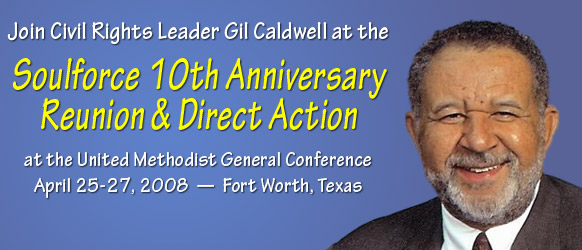
Of Rights and Rites
By Gilbert H. Caldwell
Special to the Star-Telegram
Eight years ago, at the age of 66, I was arrested at the United Methodist General Conference in Cleveland. I was arrested twice: first as part of a demonstration outside the meeting place, and later with my fellow United Methodist clergy and lay persons who disrupted the legislative session inside.
This was by no means my first demonstration at General Conference. But in the past, issues of racial justice motivated my protest.
At the 2000 conference, I joined many others in seeking justice for lesbian, gay, bisexual and transgender (LGBT) people. Standing up for LGBT rights did not always come easily to me.
As a young "foot soldier" in the civil rights movement, I was inspired by the writing and activism of Malcolm Boyd, a white Episcopal priest who wrote Are You Running With Me, Jesus? One day I read that Boyd had come out as a gay man.
As I digested the news, I discovered some unsettling emotions. Although I was deeply committed to civil and religious rights for black people, I realized that I had reservations about those rights being granted to gay people. I wondered, "Do I deny the impact his life had upon me, burn his books, turn from being an advocate to an adversary?"
After a day of reflection and prayer, my faith, reason, and common sense came alive! I could not and would not deny his influence. Just as so many white people became allies of the civil rights movement for racial justice, I determined that I would be a black, straight advocate of civil and religious equality for LGBT people.
These issues came to the forefront at the 1972 General Conference, when new legislation affirmed that "homosexuals no less than heterosexuals are persons of sacred worth." When this proposal reached the floor, a last-minute amendment added the words, "… though we do not condone the practice of homosexuality and consider this practice incompatible with Christian teaching."
In the decades that have followed, the "incompatibility amendment" has become the basis for undermining the very equality that was affirmed in 1972, and lesbian and gay people have gradually been excluded from the life of the church: first from ordained ministry (1976), then from marriage (1996), and finally from membership (2006).
Since my first ordination as a deacon in the Methodist church in 1956, I have seen us move from racial segregation to racial integration, and from excluding women from the clergy to ordaining them. In each of these instances of progress, the state preceded the United Methodist Church in extending equal rights.
Today, slowly but surely, civil rights for lesbians and gays are becoming a reality. Civil unions are legal in many states, and marriage equality is the law in Massachusetts.
Whole denominations now affirm the equality of gay and transgender people. The United Church of Christ declared full equality five years ago and recently announced growth in both membership and giving for the whole denomination.
Equality is possible — in churches and society. But to get there, we must quell our fears that the church or society will collapse if we treat others fairly. To get there, we must die to old ideas.
In 2000, I nearly died from a brain tumor. I survived with a nerve-damaged leg, a cane and a drive to use my time well. Since then, my ministry has centered on writing and speaking about the connections between different forms of discrimination. Simply put, my message is about justice.
Some ask if I will get arrested at this General Conference. I don’t know, but I do know that I will act in the tradition of Martin Luther King Jr. who said, "Injustice anywhere is a threat to justice everywhere." Now more fervently than ever, I pray that this General Conference will lead the way in doing justice for those it has so long denied.
The Rev. Gilbert H. Caldwell is a retired United Methodist minister and an active member of Soulforce, a national LGBT social justice organization. He is a former chairman of Black Methodists for Church Renewal and a co-founder of United Methodists of Color.
This op-ed originally appeared in the April 30, 2008 edition of the Fort Worth Star-Telegram, www.star-telegram.com/245/story/613555.html.
Back to the Soulforce 10th Anniversary Reunion & Direct Action